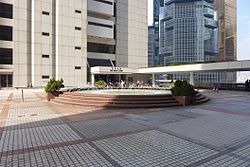Top Qs
Timeline
Chat
Perspective
Court of Appeal (Hong Kong)
From Wikipedia, the free encyclopedia
Remove ads
Remove ads
The Court of Appeal of the High Court of Hong Kong (commonly cited as "CA" or "HKCA") is the second most senior court in the Hong Kong legal system. It deals with appeals on all civil and criminal cases from the Court of First Instance and the District Court. It is one of two courts that make up the High Court of Hong Kong (which was formerly known as the Supreme Court of Hong Kong). Sometimes criminal appeals from Magistrates' Courts with general public importance are also dealt with in the Court of Appeal, either by referral by a single judge from the Court of First Instance, or upon granting of leave on application for review by the Secretary for Justice.
This court also hears appeals from the Lands Tribunal and various tribunals and statutory bodies.
Remove ads
History
Summarize
Perspective
Before 1976
Before the establishment of the Court of Appeal, appeals were either by way of re-hearing or made directly to the Judicial Committee of the Privy Council. From 1913, appeals were heard by a Full Court made up of 3 judges. From 1913 to 1943, a judge of the British Supreme Court for China in Shanghai was eligible to sit on the Full Court. In the 1910s and 1920s, a Shanghai judge would regularly travel to Hong Kong to sit on the Full Court. Sir Havilland de Sausmarez, a judge of the Shanghai court, was the President of the Full Court from 1910 to 1920. From 1926 to 1941, a judge of the Hong Kong Supreme Court also sat on the full court of the British Supreme Court for China.[2]
1976: establishment of the Court of Appeal
The Court of Appeal was established in 1976.[3] Appeals from the Court of Appeal lay to the Judicial Committee of the Privy Council in London.[4] In order to appeal to the Privy Council, leave to appeal was required either from the court appealed from or the Privy Council.
1997 - present
The Court of Appeal continued operating as part of the renamed High Court of Hong Kong upon the transfer of sovereignty on 1 July 1997, as provided for in Article 81 of the Basic Law.[5] The Privy Council ceased to hear appeals from Hong Kong, and its role as Hong Kong's final appellate court was assumed by the new Court of Final Appeal, to which all appeals from the Court of Appeal now lie.
Remove ads
Divisions
The Court of Appeal consists of three divisions, each presided over by a vice-president of the court of appeal. These include a criminal division, a civil division, and a "mixed" division that deals with both criminal and civil cases.[6]
Judges
Summarize
Perspective
The Chief Judge of the High Court of Hong Kong serves as the President of the Court of Appeal. Prior to 1997, the position was known as the Chief Justice, and its holder was the most senior judge in Hong Kong.
Prior to the establishment of the Court of Appeal in 1976, a Full Court consisting of first instance High Court judges was constituted to hear appeals.[7]
Cases in the Court of Appeal are decided by a bench consisting of one, two or three Judges. On rare occasions, having regard to the public importance of the issue, the Court of Appeal has been constituted by a division of five Judges.[8][9] Final substantive appeal hearings take place before a bench of three Judges. In civil cases, interlocutory appeals and leave to appeal application hearings take place before a bench of two Judges.[10] A single Judge can grant leave to appeal on a paper application and make procedural orders/directions not involving the determination of an appeal.[11] In criminal cases, appeals against sentence take place before a bench of two Judges[12] and leave to appeal application hearings take place before a single Judge.[13] A decision by a two-member bench of the Court of Appeal has the same binding precedential value as a decision by a three-member bench of the Court of Appeal[14][15] or a five-member bench of the Court of Appeal.[16] If a case is heard by a two-member bench and the two Judges differ on the outcome, then the lower court's judgment or order will not be disturbed.[17] In such a situation, any party can apply for the case to be re-heard by an uneven number of Judges in the Court of Appeal.[18][19]
A Judge of the Court of First Instance may also sit as a Judge in the Court of Appeal,[20] including as a single Judge (for example, when determining applications for leave to appeal in criminal cases).[21]
Significant cases
In August 2022, the court ruled that same-sex marriages overseas would not be recognized as valid in Hong Kong, resulting in no rights or benefits given to married couples in Hong Kong.[22]
In November 2022, the court ruled that there are minimum jail sentences for "serious" national security offenses.[23]
List of justices of appeal
Remove ads
See also
References
External links
Wikiwand - on
Seamless Wikipedia browsing. On steroids.
Remove ads

